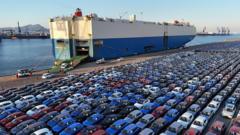President Trump's upcoming tariff announcement, branded as "Liberation Day," raises significant questions regarding the potential impact on trade, targeted nations, and how these tariffs might ripple through the economy. As businesses brace for possible increases in import costs, the uncertainty surrounding the tariffs could complicate global trade dynamics.
Uncertainty Looms Over Upcoming Tariff Announcement During Trump’s ‘Liberation Day’

Uncertainty Looms Over Upcoming Tariff Announcement During Trump’s ‘Liberation Day’
As President Trump prepares to unveil new tariffs, key questions arise about their scale, target countries, and potential economic repercussions, leaving businesses on edge.
As President Trump gears up to reveal the details of a new set of tariffs, branded as “Liberation Day,” uncertainty reigns over their implications for global commerce. The administration's previous moves to increase import taxes on goods from countries such as China, Canada, and Mexico have already put businesses and political leaders on high alert. Key questions remain: how significant will the tariffs be, what nations will be affected, and how will they impact the economy?
No specific rates have been announced by the White House, but speculation persists that a broad, across-the-board tariff could be implemented, with some analysts suggesting possibility of rates reaching as high as 60% on certain imports. The administration's rhetoric hints at a tough stance towards countries deemed unfriendly to U.S. businesses, with Trump earlier indicating that the tariffs could potentially apply to “all countries.”
The announcement has left many nations concerned, especially with previous statements from Treasury officials hinting at a focus on key trading countries labeled the "Dirty 15." These nations, which include economic powers and allies, face the looming threat of substantial tariffs. Rumors of a return to broad tariffs, as proposed during Trump's campaign, have dashed hopes of exemptions for nations like the UK, which had hoped to escape unfavored treatment.
The crux of these tariffs lies in who ultimately bears the financial brunt. While technically the responsibility falls on U.S. companies importing these goods, the ripple effects of price increases pose a risk to consumers and could lead to higher prices for everyday goods. Businesses may attempt to mitigate these costs by seeking alternative suppliers or increasing prices, but such moves come with the risk of driving customers away.
Additionally, many corporations are already sounding alarms over the potential for job losses or economic recession, both domestically and internationally. The prospect of retaliatory tariffs from other countries adds further complexity to the situation, making the economic landscape difficult to predict.
As the nation anticipates the specifics of the forthcoming tariff announcement, the uncertainty surrounding its implementation signifies a challenging era in global trade relations, where the implications of Trump's initiative are bound to have a lasting impact.






















